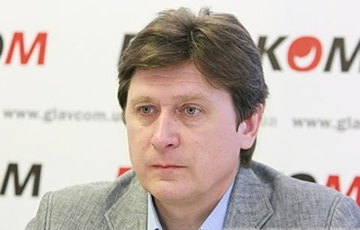Political Scientist: ‘General Frost’ Hit Russian Rear
11- 11.01.2024, 22:18
- 32,952

Russians still live in the conditions of the 19th century.
There was a heating collapse in Russia. Entire cities and even strategic military facilities were left without heating in the Moscow region.
Why did the "superpower", as Russia likes to call itself, find itself in such a position? Journalists Charter97.org spoke about this with the famous Ukrainian political scientist, head of the Penta Center for Applied Political Research Volodymyr Fesenko:
– They want to seem like a superpower. Even in Soviet times, such a term appeared. Russia was called a "gas station with a rocket" in the West after the collapse of the USSR.
One of the main signs of the status of a superpower is the nuclear weapons that Russia has. To this are added vast territories, natural resources, and a large population. There seem to be signs of a "superpower", but the economic potential is already much less. And it is used in the interests of the ruling elite, which is enriched, and not engaged in the development of the country.
Yes, while there were (and still are) billions of petrodollars, some of them are also used for infrastructure development. But it goes for such projects that should "play on the ponts", the appearance of a superpower. I mean the Crimean Bridge, the Olympics in Sochi, the World Cup and other mega-projects that could be shown, like, look how cool we are.
At the same time, they earned money on it. For example, the Rotenberg brothers and other Putin oligarchs made good money on the Crimean Bridge.
The real development of the country, the solution of real problems, was almost not targeted.
– Why did the heating collapse happen right now?
– Formally, this is facilitated by severe frosts. This is an external push that has manifested the problem. This has happened before, but now it has manifested itself largely.
In most Russian large cities, such urbanized regions as the Moscow region, where millions of people are living, the utility infrastructure looks like in Soviet times. The load on the utility infrastructure, on the heating system, has become much greater, and the network has remained the same. This gap had to work sooner or later.
I remember that more than 20 years ago, in 2002, Moscow political strategists announced that their city was facing an infrastructure crisis in 2009. They were referring to the crisis of Soviet infrastructure. That is, they predicted that the Soviet infrastructure would begin to fail in 2009, and now it is already 2024.
Also, an additional factor working to provoke this crisis is war. Most of the Russian resources are now going to the war against Ukraine. There is financing, and communal infrastructures are not engaged in, they are not modernized.
Another basic reason is the authoritarian regime. In an authoritarian regime, the authorities concentrate on such specific situations when it is necessary to consolidate resources and start the administrative machine. However, authoritarian regimes can engage in wars (albeit for a limited amount of time). They also fail in the end as practice shows.
Authoritarian regimes cope very poorly with the current social problems. This was manifested both in the USSR and in modern Russia. A significant part of Russians still live in the conditions of the 19th century.
Authoritarian bosses just throw dust in their eyes. They make money on corruption, theft and stealing just from communal money. Most often, they do not care about the real situation with the population. They are concerned about what the chief – Putin – will say.
In the Moscow region, in particular, the classic situation with authoritarian regimes has also been preserved. The governor of the Moscow region, Andrei Vorobyov, went (apparently with all his entourage) on vacation far beyond the borders of Russia for the New Year. He was not informed in time, and then the situation was like all the time in Russia – everyone was drinking alcohol on New Year's Eve. Russian sources themselves write about this.
A typical Russian situation is that they go to a holiday party and forget that there are real problems. When the crisis began, it took time to get out of the party.
Ironically, even Putin's election campaign did not play a major role here. The Kremlin's political strategists saw that now the conversation is no longer about the shortage of eggs, as last year, but about communal problems.
They are now sadly joking in Russia: "General Frost”, who was a well-known ally of Russia, hit the Russian rear. He began to freeze not the EU, but Russians loyal to Putin.
– Russia got into a heating crisis right before Putin’s "elections". Will this somehow affect the sentiments among Russians?
– It affects the mood of those people who are faced with this problem. The impact on electoral ratings is also noticeable. Indirectly, no one gives figures, but the problem has already become an electoral one. The Kremlin hopes to quickly patch up this hole and calm people down.
The most important thing is that since Stalin's time, the Kremlin has been well aware that the winner is not the one who receives the most votes, but the one who counts them. They will draw the results, it is already known in advance. The mood of the Russians was influenced by all this, as in the famous anecdote: "We have found spoons, but the ‘sediment’ remained!"
There were egg issues, now there are utility problems, and tomorrow there may be something else. Let's see, I think that the accumulation of structural social and economic problems will continue in Russia. This is inevitable.











